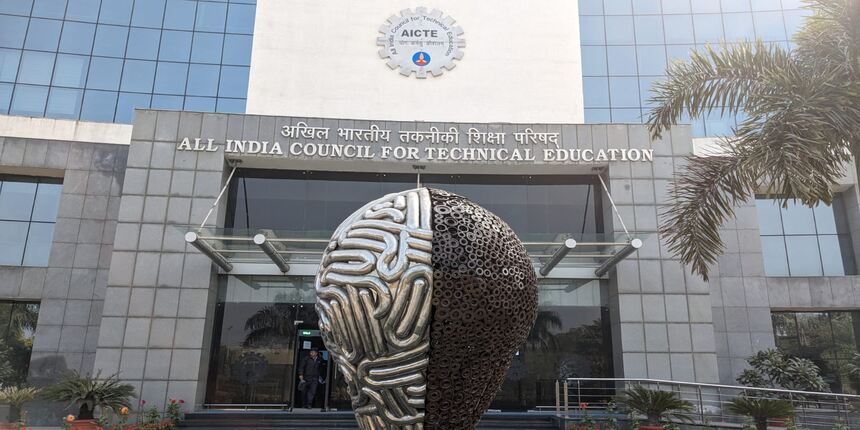AICTE to reform BBA, BCA with new curriculum, internships, scholarships; no cap on seats this year
Sheena Sachdeva | January 19, 2024 | 03:48 PM IST | 4 mins read
AICTE recently asked colleges offering BBA, BMS and BCA courses to get its approval from the 2024-25 session, leaving them worried about admissions.

NEW DELHI: The All India Council for Technical Education (AICTE) is developing model curricula for Bachelors of Business Management (BBA), Bachelors of Computer Application (BCA) and Bachelors of Management Studies (BMS) programmes, said Rajive Kumar, member secretary, AICTE. From the 2024-25 academic year, these programmes have been brought within the purview of the AICTE, India’s highest technical education regulator.
For the first year, the AICTE will also not cap intakes – number of seats – in these courses, said Kumar. BBA colleges have been concerned about AICTE’s asking them to “get its approval from the 2024-25 academic year”. They feared this may impact admissions and placements across both technical and non-technical institutions.
The decision was first communicated through AICTE Approval Process Handbook 2024-25, released in December 2023, which brought these programmes within the purview of the apex technical education regulator. The decision was officially notified in January 2024 and is expected to bring significant reforms to this set of undergraduate professional programmes.
Coming within the regulator’s ambit will make students eligible for AICTE scholarships, update the syllabus and curriculum to include more skill or employment-oriented elements such as internships and training, and guarantee minimum standards of infrastructure and teaching-learning resources.
However, opinion is divided. “Only taking a few courses under the AICTE ambit may have implications which may not be suitable to all colleges, especially undergraduate courses. Students are privileged in terms of universities in terms of fees, design, curriculum and many things. If AICTE comes into the picture, the council will formulate their own norms, conditions and syllabus which may or may not be suitable for all students, including [those from] rural, semi-urban [areas],” said Mohammad Farooq Pasha, general secretary, Bangalore University Council for Commerce and Management. Bangalore University Teachers Council have held meetings with institutes and higher education departments concerning the issue.
Also read AICTE: At 81%, BTech enrolment highest in 5 years; MTech’s lowest at 33%
“Any new policy that is introduced needs some time. All the management courses were regulated by AICTE for many years and BBA, BMS and BCA courses coming under one umbrella will help institutes eventually,” stated Sangmesh, associate professor, school of engineering, Jawaharlal Nehru University.
AICTE: Internship, new tech in curriculum
The AICTE has been regulating the management courses for at least 35 years, but BBA, BMS and BCA courses were not within its ambit. Kumar said: “We don’t have an exact answer for that. But after the National Education Policy 2020 was announced, everything is getting revised, including curriculum along with new-age skills, as new technologies are getting added into curriculum. This has made us realise that these BBA, BCA, BMS courses have not been revised for over 20 years. Despite being professional courses, a kind of routine teaching is carried out.”
AICTE is also including aspects of practical learning in the curriculum through internship, new technology and others so that the courses become a “real professional programme” in the changing scenario of new-age technology.
The AICTE team is working towards curating a new model curriculum for all the three courses and plans to introduce them before the new academic years begin. “This model curriculum is a framework and not an imposition on the institutes. All we are suggesting is to make necessary changes as per the need and requirement of the institute,” said Kumar.
Access to AICTE scholarships
Most institutes are debating the lack of consultation with stakeholders before the decision was arrived at. “Regulatory bodies have not taken anybody into confidence – neither the teachers and the university, nor the vice chancellors. It is a one-sided decision. For any new guideline or policy to be introduced, there must be some dialogue. Sudden introduction of rules harms the balance,” said Pasha.
Further, a few institutes are concerned about the admission and enrolments in rural institutes. “There is already a decline in admission in rural colleges and if technical and professional courses are regulated, it will impact the rural colleges the most,” said Sukhdev Randhawa, executive member, Punjabi Chandigarh College Teachers Union.
Kumar said, “We are concerned about rural institutes and the decision of regulating the BBA, BCA, BMS courses will be an advantage for them. After coming under the AICTE ambit, institutes that take approval are going to be eligible for AICTE scholarships. Further, institutes will be eligible for faculty development programmes and new technologies along with facilitating placements. Now these courses will be real professional programmes.”
Kumar said that the council is honouring all types of comments, both positive and negative. “We are trying to have a dialogue and trying to understand the real difficulty,” he added.
However, Anil Sahasrabudhe, chairman, National Educational Technology Forum and former chairman of AICTE added that this step will be fruitful only when the council does not charge high fees on annual approvals from the institutes. “Students will benefit through this step after these courses are approved by AICTE. But it should not transfer the burden of high fees on students. Hence, the council should keep low annual approval fees,” he said.
Follow us for the latest education news on colleges and universities, admission, courses, exams, research, education policies, study abroad and more..
To get in touch, write to us at news@careers360.com.